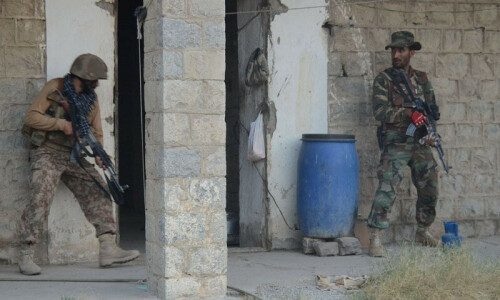UNITED NATIONS: Pakistan has informed the international community that its proposal for a strategic restraint regime in South Asia remains on the table.
In a debate at the UN General Assembly (UNGA) on Wednesday evening, Pakistan’s permanent representative Munir Akram also highlighted India’s threats of pre-emptive nuclear strikes and its daily military provocations along the Line of Control (LoC).
“Pakistan cannot remain oblivious to the disturbing security dynamics in our region” and will take “all necessary measures to ensure its security and to maintain full spectrum deterrence”, he said.
Speaking at the UNGA debate on “disarmament and international security”, Ambassador Akram said that Pakistan’s offer for “a strategic restraint” was based on the “inter-locking elements” of ensuring its own security and maintaining peace in South Asia.
Ambassador Akram presents a three-point formula for maintaining peace in South Asia
Pakistan first offered the Strategic Restraint Regime to India in 1998, which included three defining elements — stable deterrence, proportionate reduction in the armed forces and a peaceful resolution of all lingering disputes.
It was in response to India’s Cold Start doctrine of launching combined military strikes inside Pakistan to prevent it from using its strategic weapons.
In 1998, India also adopted a “no-first-use policy” but said that the promise extended only to states that did not have nuclear weapons and were not aligned with a nuclear-armed state.
“India has operationalised its ‘cold start’ doctrine of a surprise attack against Pakistan, deploying several ‘strike force’ brigades along the border,” Ambassador Akram said.
India, he said, had also “outlined plans for a naval blockade, and proclaimed the intention of fighting a ‘limited war’ with Pakistan under the nuclear overhang”, he said.
Ambassador Akram also said that “India’s so-called ‘no first-use’ policy lacks credence. Its defence minister himself cast doubt on this when he held out the threat of a pre-emptive nuclear attack last year”.
Indian Defence Minister Rajnath Singh said in August 2019 that India’s “no first use” commitment was neither absolute nor permanent, implying that in a conflict, nothing would compel India to abide by it.
Ambassador Akram also urged the international community not to ignore regional and global challenges and conventional and non-conventional asymmetries while pushing for nuclear disarmament.
“Nuclear disarmament needs to be pursued in a comprehensive and holistic manner, addressing regional and global challenges, and conventional and non-conventional asymmetries,” he said.
Islamabad has long argued that a conventional asymmetry between Indian and Pakistan forces would encourage nuclear race in South Asia and push the entire region towards a dangerous conflict.
Ambassador Akram offered a three-point formula for maintaining peace in South Asia: the resolution of disputes between Pakistan and India, particularly the core issue of Jammu and Kashmir; the maintenance of a balance between conventional forces; and reciprocal measures for nuclear and missile restraint.
India’s aggressive posture, he said, was backed by one of the world’s largest military acquisition and development programmes, with over $70 billion spent last year on new conventional and non-conventional weapons systems on land, sea, air and space.
He pointed out that: India has nuclearized the Indian Ocean; deployed anti-ballistic missiles (ABMs); developed and tested debris-generating Anti-Satellite (ASAT) weapons; and is constantly increasing the range, sophistication and diversification of all types of delivery systems and platforms.
The Pakistani diplomat noted that along the Line of Control, Indian forces resort to artillery and small arms fire every day, targeting innocent civilians. There were over 3,000 ceasefire violations in 2019 and over 2,400 this year, so far.
“Such daily military provocations are accompanied by repeated threats of aggression by India’s political and military leaders. Pakistan has acted with restraint to these provocations and threats,” he said. “But, as we demonstrated in February 2019, Pakistan will respond decisively and effectively to any Indian aggression with the full force of our capabilities.”
Published in Dawn, October 16th, 2020














































Dear visitor, the comments section is undergoing an overhaul and will return soon.